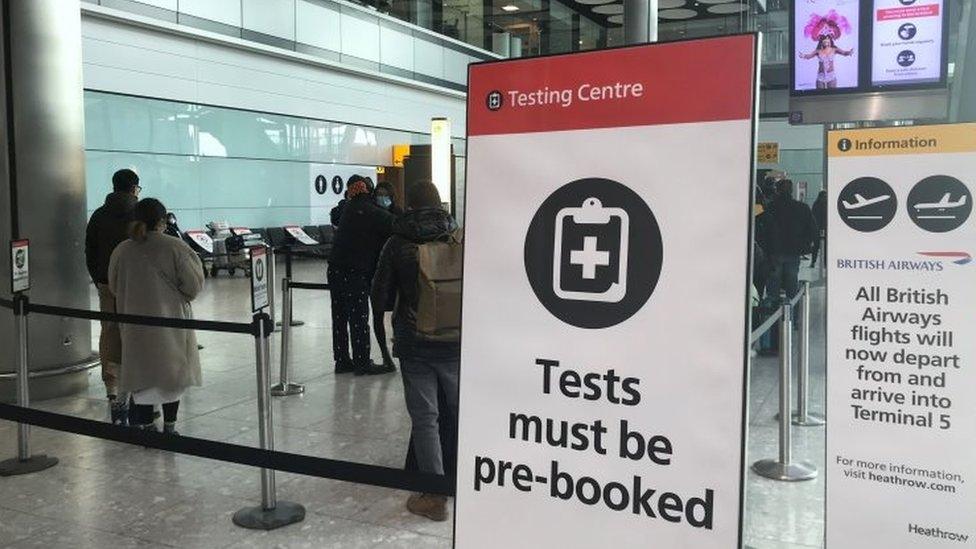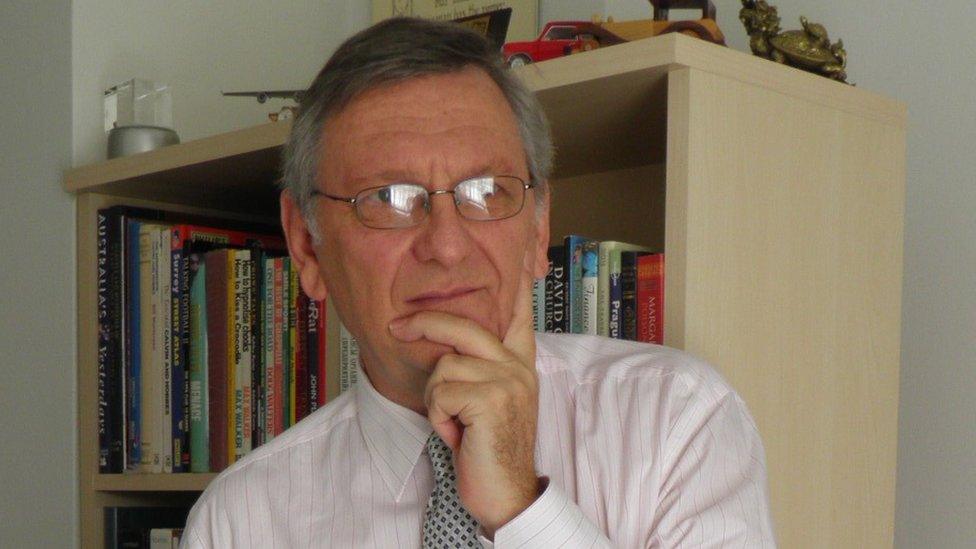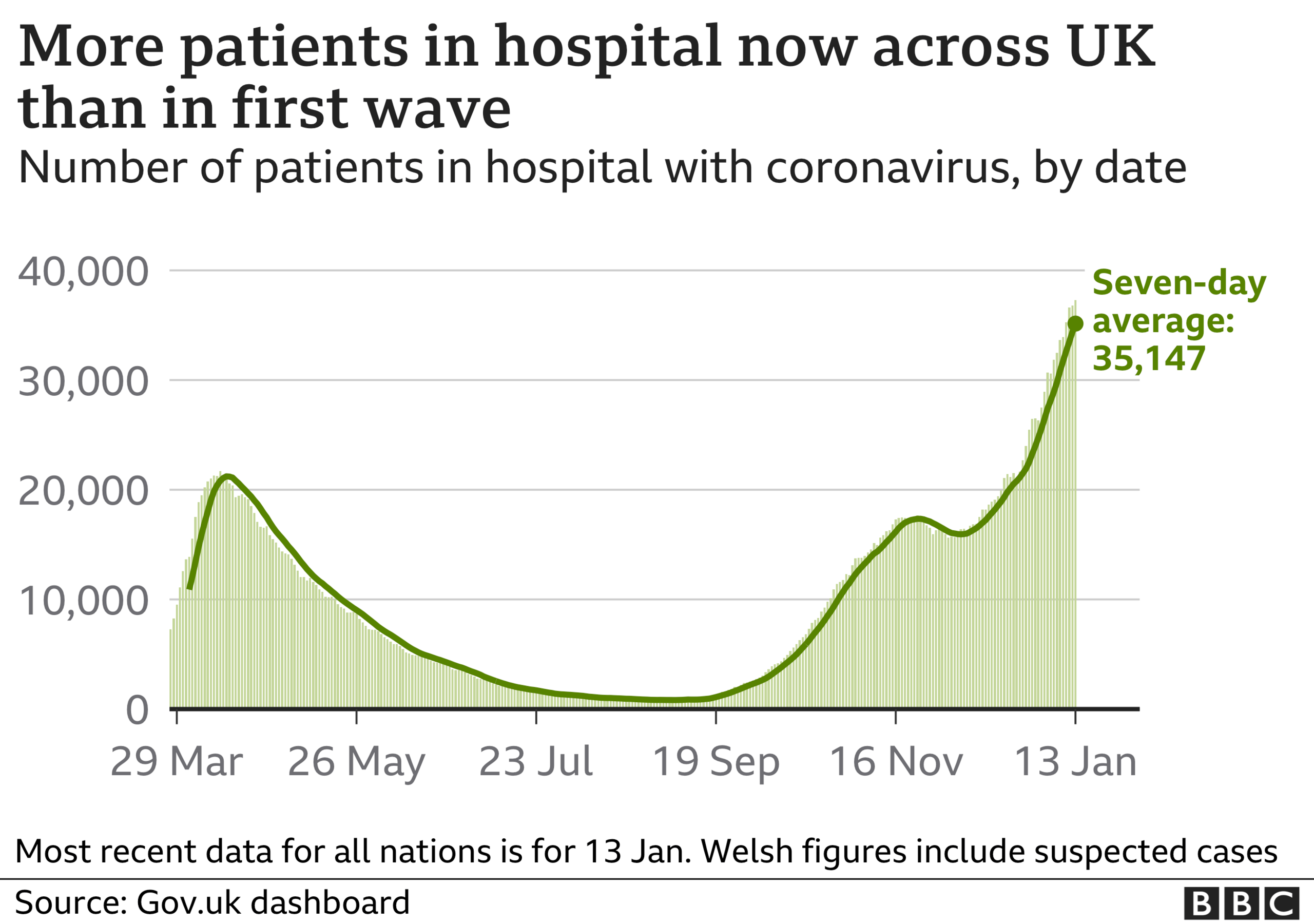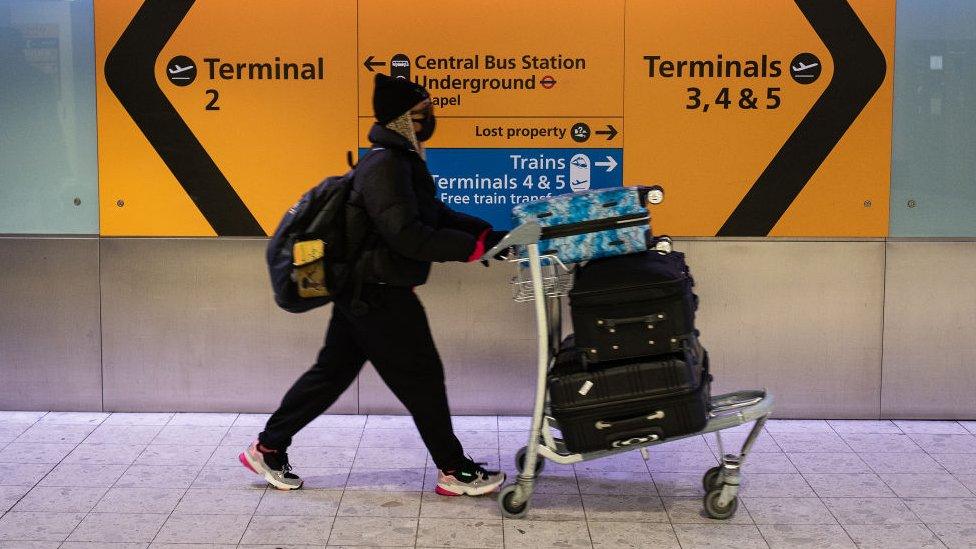Covid: 'Urgent' aviation support plea over travel curbs
- Published

The UK's aviation sector "urgently" needs more government support if it is to survive another long period of travel curbs, industry groups say.
From Monday, arrivals to the UK from all destinations will be required to quarantine in an effort to prevent the spread of any new variants of Covid.
People will also have to show proof of a negative test taken in the previous 72 hours before travelling.
The government said it was committed to supporting the travel industry.
Under the new rules beginning at 04:00 GMT on Monday, external, all travel corridors - which have been in place to allow arrivals from some countries to forgo quarantine - are being closed.
All arrivals to the UK after that time will need to isolate for up to 10 days, although the quarantine period can be cut short with a negative test after five days.
With all parts of the UK under lockdown amid high levels of infection, only essential travel is permitted. There were 55,761 new confirmed cases recorded on Friday and 1,280 more people were reported to have died within 28 days of a positive test.
Prime Minister Boris Johnson announced the changes at a Downing Street news conference on Friday, saying they would "protect against the risk of as yet unidentified new strains" of Covid.
The new rules will be in place until at least 15 February, he said.
The travel industry said closing the travel corridors was understandable due to the health emergency, but warned it would deepen the crisis for the sector.
The Airport Operators Association said that there was "only so long" before airports might have to close temporarily to save costs and called for more support.

'It's so late in the day you can't do anything about it'

Geoff Turner is currently teaching accounting and finance at the American University of Bahrain
Geoff Turner is booked on a flight back to the UK with his wife on 2 February, two days after his contract working as a university professor in Bahrain comes to an end.
After living in Australia for 40 years and travelling the world for 15 years, Geoff says he has nowhere to call home in the UK and needs to quickly find somewhere they can tell the authorities they will isolate under the government's new travel rules.
He said: "Nothing can be done now to change our flights. We'll have to quarantine for 10 days, meaning no work and no income.
"Is the government going to provide support during that time? I doubt it very much.
"It's the suddenness of it all. You find out that what you knew isn't what's happening anymore and it gets to a point where it's so late in the day you can't do anything about it."

A ban on travellers from South America, Portugal and Cape Verde also came into force on Friday, having been imposed over concerns about a new variant identified in Brazil.
New variants causing concern have previously been identified in the UK and South Africa, with many countries imposing restrictions on arrivals from both nations.
Scientists fear the variants seen in South Africa and Brazil may interfere with the effectiveness of vaccines and evade parts of the immune system.
Prof John Edmunds from the London School of Hygiene and Tropical Medicine, a member of the government's Scientific Advisory Group for Emergencies, said the South Africa variant had already been detected in the UK and it was "quite likely" that the Brazilian one had been imported too.
But he told BBC Radio 4's Today programme the "severe restrictions" the UK is under would help to contain any cases of the new variants and make it harder for them to spread.
Prof Edmunds warned relaxing restrictions at the end of February with only the most vulnerable having been given a first dose of the vaccine would be a "disaster".
"If we relaxed our restrictions we would immediately put the NHS under enormous pressure again," he said.
'Lifeline'
Travel corridors were introduced in the summer to allow people to travel to and from some countries with low numbers of Covid cases without having to quarantine on their return.
Tim Alderslade, chief executive of Airlines UK, said the system had been "a lifeline for the industry" last summer but "things change and there's no doubting this is a serious health emergency". He said he assumed the government would remove the latest restrictions as soon as it was safe.
"We've had no revenue now effectively for 12 months, give or take a few months in the summer last year. If we're going to have an aviation sector coming out of this we need to open up in the summer," he told the BBC.
Abta, a trade association of travel agents and tour operators, said the government should provide support "as a matter of urgency" both for the jobs and businesses at risk, and "in recognition of the important role the travel industry will play in the UK's economic recovery".
Labour leader Sir Keir Starmer said closing the travel corridors was the "right step" but called the timing of the decision "slow again", adding that the public would be thinking "why on earth didn't this happen before".
Labour also criticised the effectiveness of the quarantine system, with shadow home secretary Nick Thomas-Symonds saying "it's been a real problem". Only about 3% of people were contacted to ensure they were quarantining, he said.
But aviation minister Robert Courts told the Today programme there was a "robust enforcement process", with three million spot checks of the passenger locator forms which travellers are required to fill in on arrival.

A Department for Transport spokesman said it was supporting the travel industry with an extension to the furlough scheme until the end of April, business rates relief and tax deferrals.
Travel operators had already been forced to cancel holidays before the latest restrictions were announced.
Earlier this week, Jet2 suspended all flights and holidays until 25 March over "ongoing uncertainty" and budget travel provider EasyJet on Thursday began cancelling holidays up to and including 24 March.

LOOK-UP TOOL: How many cases in your area?
LOCKDOWN LOOK-UP: The rules in your area
TESTING: How do I get a virus test?

In other developments:
The latest figures show that more than three million people in the UK have now received the first dose of a vaccine - 3,234,946 - an increase of 316,694 from the previous day
The UK will face short-term delays in delivery of the Pfizer vaccine, as the company makes modifications to its plant in Belgium. But the government says it still plans on achieving its target of vaccinating all top four priority groups by 15 February
Six EU nations have called the situation "unacceptable" and warned it "decreases the credibility of the vaccination process"
New tighter Covid restrictions have come into force in Scotland with changes for takeaway outlets and click and collect shopping

RUPAUL'S DRAG RACE UK: Mama Ru's back with 12 fabulous drag queens. Who gets the crown?
DEATH IN BOLLYWOOD: How did Jiah Khan die? For her British family, the truth about her death still hasn’t come out


Are you abroad and unable to get home before the new rules kick in? Do you work in aviation and have concerns about your job? Email haveyoursay@bbc.co.uk, external.
Please include a contact number if you are willing to speak to a BBC journalist. You can also get in touch in the following ways:
WhatsApp: +44 7756 165803
Tweet: @BBC_HaveYourSay, external
Please read our terms & conditions and privacy policy
If you are reading this page and can't see the form you will need to visit the mobile version of the BBC website to submit your question or comment or you can email us at HaveYourSay@bbc.co.uk, external. Please include your name, age and location with any submission.
Related topics
- Published14 January 2021

- Published1 July 2022
